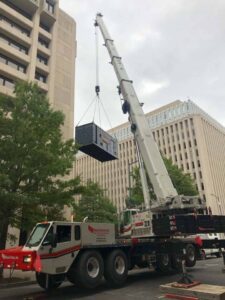Mistakes to Avoid When Dealing with Cranes
Proper Crane Maintenance and Inspections
Construction just won’t get done without cranes and their ability to lift and move heavy loads with precision. Working with a crane, however, requires a detailed approach to safety and efficiency to guarantee that the worksite remains accident-free. Even a seemingly small mistake during crane operation could spell disaster for life, limb, and property in the area. In this article, we will explore common mistakes to avoid when working with cranes, and how to avoid the hazards that can befall a crane operation.

Don’t Underestimating the Weight of the Load
One of the most critical mistakes to avoid when dealing with cranes is underestimating the weight of the load. Improper assessment can lead to overloading, jeopardizing the crane’s stability and putting both personnel and property at risk. Before lifting any load, it is essential to accurately determine its weight and ensure that the crane’s capacity aligns with the task at hand. Failure to do so can result in structural damage to the crane, accidents, and even fatalities.
Consider the Weather Conditions
Weather conditions can have a significant impact on crane operations. Ignoring factors such as wind speed, precipitation, and extreme temperatures can lead to accidents and equipment failure. High winds, for example, can compromise the stability of the crane and increase the risk of load swinging. Make sure to monitor the weather conditions before you begin any crane operation and pay continuous attention to ongoing weather conditions throughout crane activity. If the weather starts to become unsafe, stop all operations immediately and postpone them until the weather returns to normal.
Make Sure You Have the Necessary Permits and Approvals
Dealing with cranes often requires permits and approvals from relevant authorities. Failing to secure the necessary paperwork can result in legal consequences, project delays, and increased safety risks. It is imperative to be aware of local regulations governing crane operations and obtain all required permits before commencing work. This includes permits related to road closures, noise restrictions, and environmental considerations. Compliance with regulations ensures a smooth operation and minimizes the risk of fines or legal complications.
Go With Experienced Crane Service
Selecting an experienced and reputable crane service will assist the success and safety of any lifting operation. Entrusting the job to an inexperienced or unreliable service provider can lead to operational inefficiencies, equipment malfunctions, and accidents. Prioritize crane services with a proven track record, proper certifications, and skilled operators. Thoroughly vetting service providers ensures that they have the expertise to handle various lifting tasks and adhere to industry standards. If you are in need of reliable commercial rigging services, consider the professionals at L.R. Willson & Sons Crane Rental. Our team of experienced riggers and state-of-the-art rigging equipment can handle any project, big or small. Contact us today to learn more and get started.
Take Care with Safety Precautions
Neglecting safety precautions is a grave mistake when dealing with cranes. Safety should be the top priority on any construction or industrial site where cranes are in use. Failing to implement safety measures can result in injuries, fatalities, and damage to property. Ensure that all personnel involved in crane operations have received comprehensive safety training. This includes understanding signal communication, wearing appropriate personal protective equipment (PPE), and following established protocols for rigging and load handling.
Safety Tips for Dealing with Cranes
- Training and Certification: Ensure that all crane operators and personnel involved in crane operations are properly trained and certified. Regular training sessions and updates on safety protocols are essential to keep everyone informed about the latest industry standards.
- Pre-Operational Inspections: Conduct thorough pre-operational inspections of the crane and its components before each use. Identify and address any issues promptly to prevent equipment failure during operation.
- Clear Communication: Establish clear and effective communication protocols between the crane operator and ground personnel. Proper signaling is crucial to avoid misunderstandings and prevent accidents.
- Load Chart Reference: Always refer to the crane’s load chart and capacity ratings before lifting any load. Adhering to these guidelines ensures that the crane operates within its safe working limits.
- Ground Conditions: Assess and prepare the ground conditions where the crane will be set up. Ensure that the ground is stable, level, and capable of supporting the crane’s weight and the load being lifted.
- Emergency Preparedness: Have emergency procedures in place, including first aid kits, evacuation plans, and communication channels in case of unforeseen incidents. Regularly conduct drills to ensure that personnel are familiar with emergency protocols.
Working with cranes requires meticulous planning, attention to detail, and a commitment to safety. This is why you should contact L.R. Willson & Sons Crane Rental. With over 50 years of experience, an extensive fleet of cranes, and over 150 dedicated employees, we have the tools and expertise to help you get the job done right. Our attention to safety and efficiency have earned us certifications from the American Institute of Steel Construction and the Precast Concrete Institute, as well as endorsement from the National Commission for the Certification of Crane Operators. We provide service to Washington, Annapolis, Baltimore, Northern Virginia, and the surrounding areas. Call us today at 410-695-3967 for a free project estimate.
““
